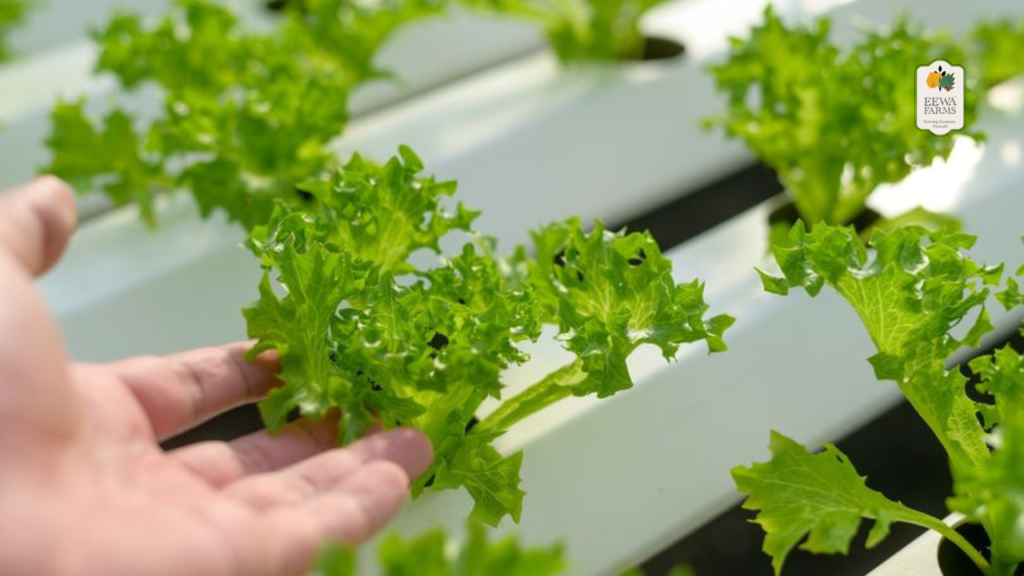The Future of Food: How Hydroponics Delivers Superior Vegetables
The Future of Food: How Hydroponics Delivers Superior Vegetables

Introduction:
Nowadays, finding truly fresh and nutritious vegetables can be a challenge. However, this problem is being solved with hydroponic farming. Hydroponics, a modern method of growing vegetables without soil, is gaining popularity because it promises fresher, cleaner, and more nutritious vegetables.
As cities grow and our lives become busier, hydroponics offers a new way of ensuring our families can access high-quality, fresh vegetables.
How Hydroponics Works: A New Approach to Growing
Unlike traditional farming, where vegetables are grown in soil, hydroponic farming uses nutrient-rich water. This water is meticulously controlled to give plants everything they need to grow faster and healthier.
In a hydroponic farm, the environment is monitored to ensure the perfect temperature, light, airflow, and nutrients for the plants. This helps the vegetables grow without the problems that often come with soil, like pests and diseases. The result is cleaner, healthier vegetables that are grown without the use of harmful chemicals.
Unmatched Freshness: From Farm to Table Faster
Hydroponic vegetables are known for their unmatched freshness. Because hydroponic farms are often located closer to where people live, the vegetables can be delivered to homes much faster. They don’t have to travel long distances like traditional farm produce.
This means that the vegetables you get from hydroponic farms are fresher and packed with more flavor. Fresher vegetables also retain their nutrients better, giving our families the vitamins and minerals they need to stay healthy and active.
Nutritional Superiority: A Boost in Vitamins and Minerals
Hydroponic vegetables are often more nutrient-rich than those grown in traditional soil. Since the water used in hydroponics is filled with the right balance of nutrients, plants get everything they need for strong growth.
When vegetables grow in soil, the amount of nutrients they receive depends on the quality of the soil. But with hydroponics, the vegetables always get an optimal mix of vitamins and minerals. This results in healthier vegetables that provide your family with more essential nutrients like vitamin C, iron, and calcium.
Water Efficiency and Sustainable Farming
Hydroponic farming is also kinder to the environment, especially when it comes to water use. In traditional farming, a lot of water is wasted as it seeps into the soil or evaporates. However, hydroponics uses 90% less water because the water is recycled and reused within the system.
This makes hydroponic farming a smart choice for areas where water is scarce. By choosing hydroponic vegetables, you’re not only giving your family fresh and nutritious food but also supporting a farming method that conserves water and helps protect the environment.
Pesticide-Free and Cleaner Produce
Many people are concerned about the use of insecticides, weedicides, and pesticides in traditional farming. These chemicals can sometimes linger on vegetables, even after they are washed. Hydroponic farming provides a solution to this problem by growing vegetables in a protected environment where there is little need for these harmful chemicals.
Because the plants are grown in water instead of soil, they are less likely to be affected by pests or diseases. This means hydroponic vegetables are cleaner and safer for your family, free from harmful chemicals that are often used in soil-based farming.
Local and Year-Round Production
One of the exciting benefits of hydroponic farming is that it can be done locally, often inside cities. This means vegetables can be grown closer to where they will be consumed, reducing the time between harvest and delivery.
Another advantage is that temperature-controlled hydroponic farms can produce vegetables all year round, regardless of the season. This ensures a constant supply of fresh vegetables, even when certain crops would normally be out of season in traditional farming. For mothers who want to provide their families with fresh vegetables, this is a huge advantage.
The Future of Freshness: Hydroponics Leading the Way
Looking into the future, hydroponic farming is set to play a major role in how vegetables are grown and delivered. As our cities grow and traditional farming faces challenges like limited land and water shortages, hydroponics offers a solution that is both sustainable and practical.
Hydroponic vegetables provide unmatched freshness and nutrition, while also being better for the environment. For families that care about health and sustainability, hydroponic vegetables are the ideal choice.
Conclusion
Hydroponic farming is leading the way to a future where fresh, healthy, and nutritious vegetables are always available. By using less water, avoiding harmful pesticides, and delivering vegetables faster, hydroponics is changing the way we think about food.
Every mother wants to provide the best for her family, and hydroponic vegetables make that easier. They offer superior freshness, better nutrition, and peace of mind that the food you’re serving is clean and safe. Choose hydroponic vegetables for a healthier future for your family and the planet.

